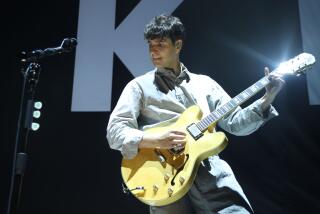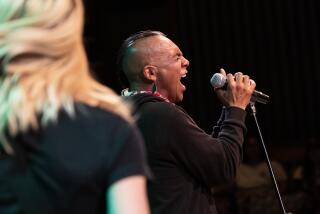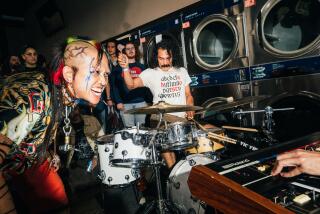Sewage Plant’s Namesake Band Keeps Toes Tapping
- Share via
Bob White has always had an ear for lyrical-sounding phrases, and he loved the way “Hy-PER-i-on OUT-fall” tripped pleasantly off the tongue.
Never mind that it referred to the ocean discharge point of the Los Angeles sewage treatment plant next door to Manhattan Beach, the picturesque, increasingly upscale town that White has called home for more than 40 years. So when he and a couple of other locals decided in 1969 to put together a “mostly” Dixieland-style band during their spare time, they had no trouble coming up with a name.
Since then, the Hyperion Outfall Serenaders--most of whose members now are retired--has become a fixture at gatherings throughout the South Bay and beyond. The group has even been proclaimed the official band of Manhattan Beach by the City Council.
“We like to believe there exists absolutely no connection between the product of the treatment plant and that of the musicians,” deadpans White, a youthful 73. He is a retired electrical controls salesman who plays cornet, does some vocals and, according to the liner notes on the album the band made in 1986, “occasionally attempts to be leader of the band.”
Dressed in white pants and matching shirts (the color and style vary from gig to gig), the Serenaders have played at street fairs, parades, picnics, dances, 10-K runs, retirement parties, anniversary celebrations, ribbon-cuttings, civic ceremonies, weddings and the
occasional funeral. They have also graced a couple of
“grand closings,” a dog show and a horse auction.
Each year, they open the summer concert series at Manhattan Beach’s Polliwog Park and can always be heard at the city’s annual Old Hometown Fair the first weekend in October.
And, in May 1999, when Los Angeles officials celebrated completion of their sewage treatment plant’s $1.6-billion expansion, guess who provided the music?
“There we were, right up on the stage, along with the mayor of Los Angeles and other dignitaries--positive acknowledgment at last,” quips White.
The band started out with just three men--playing cornet, clarinet and trombone, with one of their wives sometimes providing a rhythm section via tambourine. The roster has changed over the years, shrinking as some players moved away and expanding as others signed on. Currently, there are nine regulars, including one woman.
The regulars are White, Jack Freeman (trombone), his wife Fran Freeman (washboard) and brother Dave Freeman (tuba); Jimmy Green (banjo), Sid Pattison (clarinet), Jimmy Shivnan (clarinet), Jules Radinsky (vocals) and Luis Pastor (drums). They are joined periodically by Karl Keller on soprano saxophone and Rod Norris on clarinet.
Serenaders lore has it that Fran Freeman got herself added to the roster when she told her husband that he could join only if she could, too.
All but one of the band’s musicians are retired from their day jobs, which included electronics engineer, dentist and wood shop teacher. Most are in their 60s or 70s. Vocalist Radinsky, a former director of the Seattle Pops and Seattle Summer Symphony, will be 90 in January. Drummer Pastor, 51, is the youngest.
Which probably explains their repertoire. A band flier describes it as “music from the late 1800s up through the 1930s and maybe a little beyond (no rock, however) and some ragtime is included. It’s happy, toe-tapping stuff.”
Their playlist at a Manhattan Beach Neighborhood Watch pancake breakfast one recent Saturday included “Ja Da,” “Wolverine Blues,” “Chinatown” and “Manhattan Beach March,” a John Philip Sousa tune named after a sand strip near that other Manhattan on the East Coast. (There is another connection here: The Freeman brothers’ father played with Sousa’s band.)
“I’m really enjoying them,” said Madeline Wruck, a Neighborhood Watch block captain who was hearing the group for the first time.
Others at the breakfast were veteran listeners.
“They’re a landmark here,” said Mary Brown as she listened to the band. “They’re a lot of fun.”
Nobody has more fun at a Hyperion Outfall Serenaders gig than the musicians themselves, especially on “road trips.” Each New Year’s Eve they play on Catalina Island--and stay a while to party with wives, friends and whatever fans they might have collected the night before.
For several years during the 1980s, the band made regular appearances at Pasadena’s Doo-Dah Parade, the irreverent send-up of the city’s venerable Rose Parade. They rode on a float with flowing beer and a “fully functioning” outhouse, but were a little miffed that they kept losing out on press coverage to such crowd-pleasers as the business-suited briefcase drill team.
So one year, they dressed their “groupies” (friends and family members) as giant briefcases and had them perform a drill carrying small toy people.
“We made the front page of the Pasadena Star News,” recalls White, chuckling in satisfaction.
The band’s fees vary widely, based on the driving distance and the length of time they are to play. All the earnings go into a kitty to pay for equipment or other needs. But, they’ll play for free for a good cause.
White isn’t afraid to beam his sense of mischief at his own community, where he is among many old-timers lamenting the rapid “yuppie-fication” of the once laid-back beach town.
In March, the Hyperion Outfall Serenaders were honored by the City Council to mark their 25 years as the town’s official band. Naturally, the group was invited to mark the occasion with a tune or two.
White got the band to perform an old standard called “Home in Pasadena,” for which he had penned new lyrics. They went like this:
Home here in Manhattan
What the heck has happened?
They’re tearing down--the whole damn town
And building castles--the dirty rascals!
And my new neighbor is a yuppie
Built a house so tall
It blocks my view--What can I do?
You can’t fight City Hall!
More to Read
The biggest entertainment stories
Get our big stories about Hollywood, film, television, music, arts, culture and more right in your inbox as soon as they publish.
You may occasionally receive promotional content from the Los Angeles Times.











